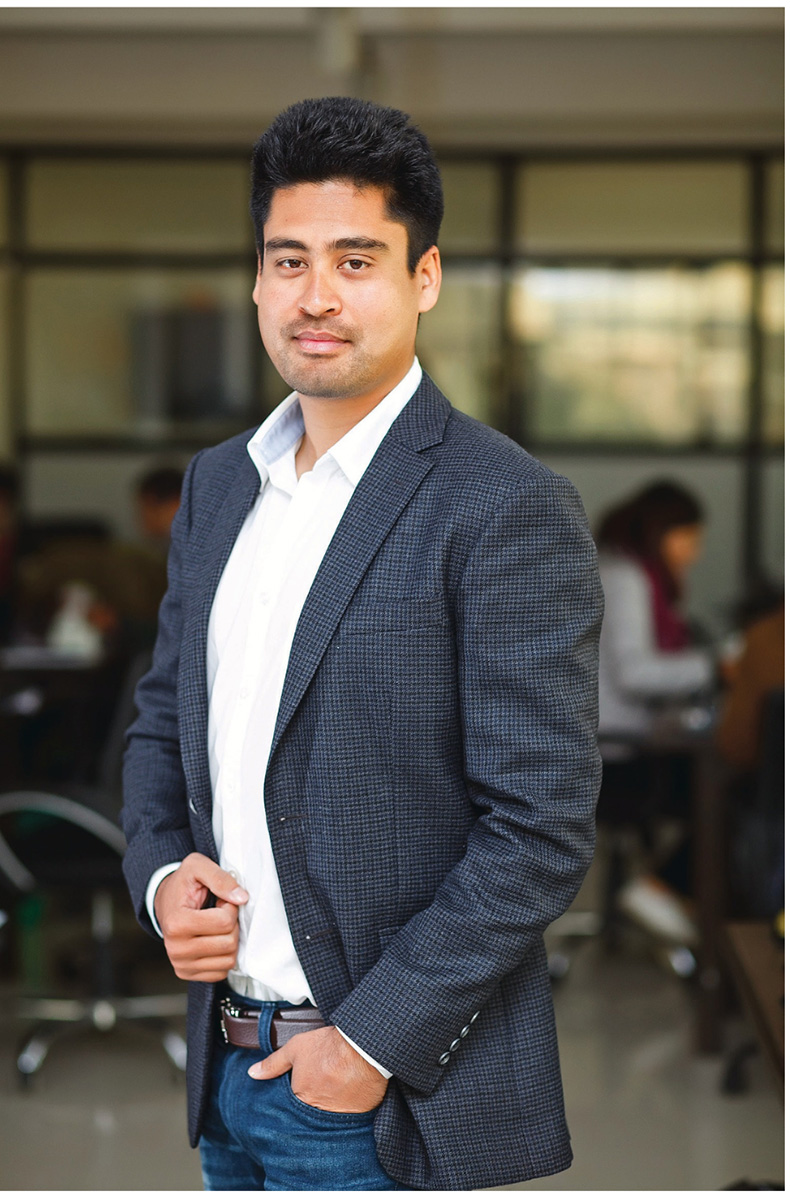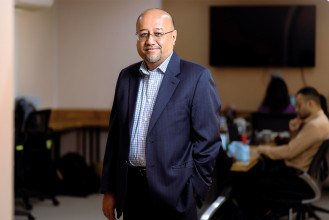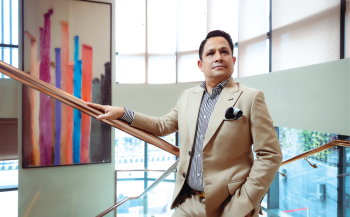
New doesn’t always mean better
The new generation is so overwhelmed with doing something new that they tend to overlook the basics of doing business, which is feasibility and profitability. New doesn’t always mean better, you should look for successful business models that have the potential to grow, do the right business instead of doing new business,” says Rajeev Amatya, Founder and Managing Director, Daraz Kaymu Pvt Ltd, the number one online shopping community in Nepal. According to Amatya, young businessmen and entrepreneurs should look for business models that have succeeded globally, and adapt those models to suit the country. “Before starting any venture, see if there is a market for it, and make certain whether the soil is really fertile. And don’t be afraid of the competition, you can’t avoid competition, you have to outperform competitors,” he states.
Beginnings of Daraz
Daraz is the number one online shopping platform in Nepal, also known as an e-commerce platform or online market. It provides a platform for local sellers, vendors and brands to connect with potential customers online. “We offer a platform to the vendors to meet with their customers at a certain fee, and we also support them with appropriate technology and marketing services. We started around three years ago as Kaymu, and now we have rebranded to Daraz,” explains Amatya. Daraz is fully owned by Rocket Internet, a German venture capital company.
The search for greener pastures
Amatya was born in 1985 in Kathmandu to Krishna and Rita Amatya. He did his schooling from Siddhartha Banasthali. After which he joined St Xaviers College. “At that time, everyone was either opting for medicine or engineering or going abroad. I also wanted to go abroad and went to USA for my further studies,” recalls Amatya. He did his Bachelor’s degree in Accounting and Economics from Ohio Wesleyan University. Later he moved to Europe due to recession in USA and the limited opportunities. Amatya did his Masters from University of St Gallen in Strategy and International Management. “I was interested in investment banking at that time, and I interned at Credit Swiss. I also interned and worked for a few other companies. It was then that, I received an offer from Italy. The Italian government was offering a grant of 25,000 Euros for tech startups. Along with a few friends I applied for it got selected and went to Italy,” says Amatya. They opened and ran a tech startup for six months, but that didn’t go very far. He again moved to Germany in search of greener pastures. While in Germany, officials from Rocket Internet came across Amatya’s profile on Linkedin and wanted to meet him for a project. “I had a meeting with the Europe Head of Kaymu at that time. They were planning to start an e-commerce site in Nepal, and they wanted me to look after it as its head. At first I couldn’t believe that a company as big as Rocket Internet would enter Nepal. I readily joined after hearing the plans and thus started my journey with Kaymu,” shares Amatya.
On a steady incline
When starting, Kaymu had a small team of 4-5 people. The website had very little traffic and even fewer orders. But in a span of two and a half years, the company has grown exponentially. “Today we have a team of more than 70 and we have 600,000 thousand visitors per month to our website, and the number is on a steady incline. We have successfully become the number one online shopping community in Nepal,” says Amatya. The website initially had about 4,000 vendors, but after being rebranded to Daraz, the number has reduced to about 400 with plans to go up to a thousand. “This is because now we want only genuine sellers and products with us; we will only be representing genuine sellers henceforth. We have focused a lot on quality control. We won’t be showcasing duplicate products or replicas to ensure quality,” explains Amatya. According to him, this move will improve Daraz’s reliability and help gain the trust of customers. “This has definitely affected the sales and revenue, but it will be a good decision in the long run. We have stricter standards and quality control procedures. Ultimately, our customers will benefit from this,” he elaborates.
 Target of 300-400% growth per year
Target of 300-400% growth per year
Amatya says that the website will expand its categories. “Till now, we have mostly focused on fashion and electronics, but now we are adding more products in music, sports, books, home decor, furniture and FMCG categories. We may also foray into travel and tourism packages. We will go on adding new categories that our business model allows. We will add those commodities that people prefer to purchase online,” he says. Daraz will focus strongly on quality-control in the future and will showcase more reliable and genuine products only. Amatya says that e-commerce is a business that doesn’t go into profit overnight, it takes a few years to be profitable. “We are growing, and we are here for the long run. We will be breaking even in a few years. We have a target of 300-400% growth per year,” he says. Besides sales, Daraz will also focus on create online shopping awareness among customers. The current target group is the younger generation that is tech-savvy. “Soon we will be marketing in traditional media as well to increase our customer base. We will also experiment on models that will facilitate those who are not too familiar with technology. We will be taking orders from outside of Nepal as well. That’s a huge market and we want to penetrate that market too,” says Amatya.
The future of how business will be done
Amatya represents a generation of young and new entrepreneurs who are set to create the future of how business will be done in the country. Yet there are numerous challenges to be met. Amatya says that the regulatory framework in Nepal is not very clear, and as his is a foreign-owned company, the starting process was tedious and lengthy. “The laws and policies are very unhelpful and reluctant towards FDI. Also, while starting, there was no stability. While starting, I faced the earthquake of 2015, then the economic embargo and the unstable governments. It was quite a tough journey. Another problem that I faced is lack of a capable workforce. It is really tough to make a good team. All the young people are going abroad, so it was quite hard to gather a good team,” he says. Despite the hurdles, Daraz has grown significantly. A lot of the employees with Daraz are overseas returnees. “I have noted that those who return to Nepal want a good working environment and a good pay, and I am happy we have been able to do that. Now we have s a very competitive, hardworking and skilled team,” shares Amatya.
FDI in e-commerce will attract the new generation
Amatya says that Nepal is changing and growing, and there are numerous opportunities here for those who want to work hard and try their luck. “Life abroad isn’t a cakewalk either, there are challenges and hardships to be faced everywhere, and it’s no different here in Nepal. There are a lot of untapped opportunities here. I just want to suggest that you do your homework before planning anything and starting any business,” says the young entrepreneur. Amatya feels the need for more FDI-based companies in Nepal. He says that they are only present in sectors like hydro, manufacturing and natural resources which cannot capture the interest of the younger generation. “If we can have FDI-based companies in areas like e-commerce, technology and digital media, it can attract the newer tech-savvy generation and they will be inclined to work in Nepal itself,” he opines.
Teamwork, leadership and transparency
Being the Managing Director, Amatya basically looks after everything. “I have hired a few line managers and I deal with them. My priority right now is to grow the size of our sales and gain more customers and retain them. As I am quite new, I don’t have long experience in management but I am constantly learning,” says Amatya modestly. Overtime, he says he has grown together with the company and has learnt many things along the way. “Initially, I was very result-oriented, but now I am also system and process-oriented. I have learnt to work with the system. I have figured out that temporary growth is not what I should be looking for,” says Amatya. According to him, meeting targets for awhile is not enough, it has to be sustainable and the system and processes should be in place too. “I used to micromanage while starting out, but now that has changed. I have hired a few managers, and groomed and trained them and given them the authority and accountability. As ours is a new company, I have understood that there is no learning without making mistakes, so there is room for some errors, but I try to learn from the mistakes and the same goes for my employees,” he points out. Amatya also emphasises on teamwork, leadership and transparency in the company to attain desired outputs.
Play the guitar
Amatya likes to spend his free time playing tennis, cycling and travelling. He is into music and likes to play the guitar. On weekends, he is busy learning computer programming, and sometimes gives guest lectures at colleges. Amatya says that he feels very lucky to be able to live and work in his own country. “It’s quite a luxury these days as now we have to choose between family and career. I am thankful that I got associated with Daraz. The company is growing, and the fact that I have been able to give good opportunity to our employees makes me even more satisfied,” he concludes.





-1757917838.jpg)